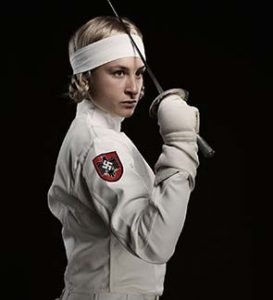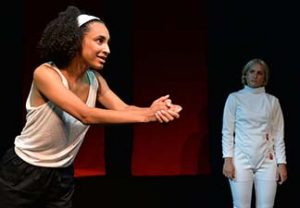By Lucy Komisar
How does a sports champion deal with political morality? What does she care about? Personal achievement? A sense of justice? How does she ignore that her sponsors are killing her people?
Henry Naylor, the Brit whose plays till now have dealt with the moral questions posed by Islamic terrorism and the response to it, and to issues of the historical oppression of women, takes that last subject to a new challenge in a dramatic and important Edinburgh Festival Fringe production. This is based on true facts. Naylor has become a major theatrical chronicler of the morality of political conflict.

Helene Mayer (the excellent Avital Lvova) was a fencer at age 10. By 13 she was a German champion. She was Jewish, in a time the Nazis came to power, and she had to deal with being a sports star of a country killing her people.
The 1932 Olympic Games were in Los Angeles. By racial laws, Helene has been thrown out of her sports club, has no facilities to compete. But she wins the US competition.
Another athlete, a high jumper, is Gretel Bergmann (Tessie Orange-Turner,) a role pointedly played by a black woman. She is told, “You could be another Helene Meyer.” (On casting, Lvova, who plays Mayer, is Jewish.)
But when Helene comes to her school and Gretel, with frizzy corkscrew curls, says, “I‘m Jewish too,” Helene says, “I‘m not a Jew. Sport stars have no business with politics.”
Then when the Nuremberg laws are passed, Helene (albeit very blonde) is no longer German. In the play, Gretel tries to persuade her to boycott the 1936 Berlin games, that they are fighting for something bigger.
But Helene rejects that. At 17, and a great athlete, she would be the only Jewish member of the German Olympic Squad at the games. She fights for the championship, and comes second, with a gold. Standing at the winners’ podium, she gives the Heil Hitler salute.
Mayer would be condemned in history.
Gretel calls her “the betrayer of the Jews.” She immigrates to America.

In 1946, they are in New York, and Helene makes her last stand in a US national fencing tournament. She would die of cancer in the early 1950s. Gretel lived to 103, and died in New York.
Directer Louise Scanning shows each of the woman as self-assertive but very different, Helene aloof, Gretel passionate in her commitments.
Lvova‘s fencing movements are strong, elegant, a choreography of what the sport displays. Gretel is very fine as the committed seeker of justice.
The question Naylor poses is the morality of fighting for yourself or for a team, ie for your society. As you follow the story, the latter is the only ethical choice.
“Games.” Written by Henry Naylor. Directed by Louise Scanning. RedBeard Theater and Gilded Balloon, Edinburgh Festival Fringe, Edinburgh. August 1-27, 2018.

